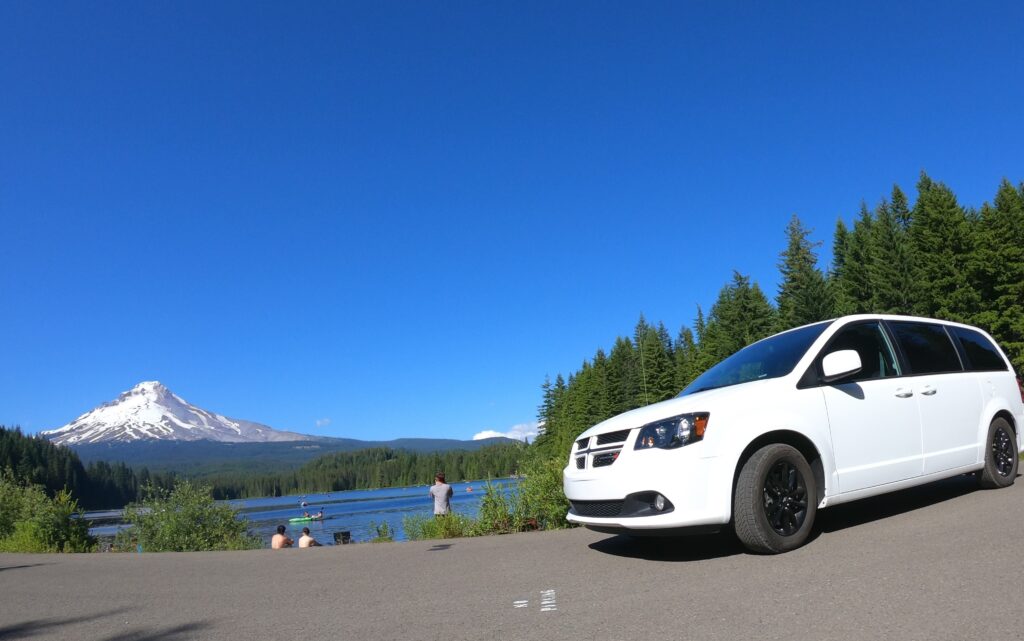Air conditioning in a camper van might sound like a luxury, but depending on where you travel, it could be a necessity. Even the most well-thought-out recreational vehicles can feel uninhabitable in hot temperatures and humidity.
A camper van air conditioner is essential for keeping cool and helping you (and your pets!) travel safely throughout the year, especially on a hot summer day or during an unexpected heat wave. It’s also clutch when you need a reprieve from outdoor adventures.
Don’t know where to begin? Chill out! We’ve got you covered. Here’s everything you need to know about choosing a campervan air conditioner.
Table of Contents

What Makes a Good Camper Van AC System
Let’s go over the basics of what a camper van air conditioner should do for you and what features and aspects you should consider when choosing the best one.
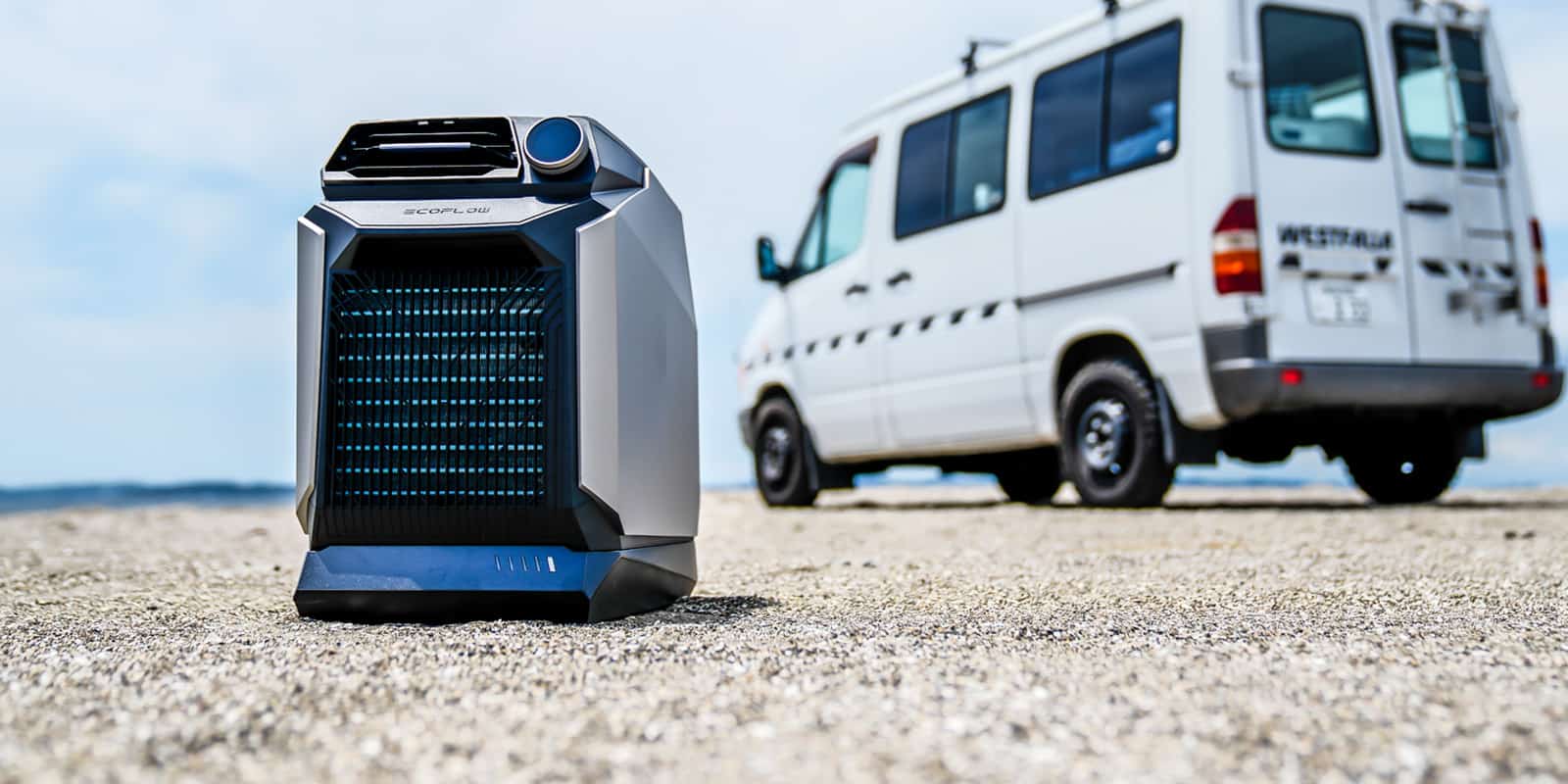
Cooling Capacity
First and foremost, an air conditioner needs to be able to adequately cool your indoor environment. When talking about air conditioners, the cooling capacity is defined in BTUs (British Thermal Units). The higher the BTUs, the more space the unit can cool. But if your unit is too powerful for the space you need to cool, you might just be wasting energy, which is a precious resource in a camper van!
Energy Efficiency and Power Consumption
To maximize efficiency and keep your camper van comfortable, it’s important to employ passive cooling techniques in addition to an air conditioner. For example, well-insulated vans will keep the cool air inside the van and help to keep the hot air out. Reflective window coverings will help an air conditioner perform more efficiently by absorbing the hot sun and radiating it back outwards.
Power consumption and battery life are critical for those camper van folks who want to travel off-grid and get their energy from the sun. Different types of air conditioners, which we’ll go over soon, use different amounts of power. Look at how many watts the air conditioner will be pulling from your camper van’s power sources.
Keep in mind when adding an air conditioner to your van’s electrical system, you still need to power all of your regular devices, like laptops, phones, refrigerators, cooktops, and fans, too. A common practice for installing air conditioners in camper vans is to dedicate specific batteries, for example, 300ah, solely to operate the AC.
Noise
Are you a light sleeper? Consider the noise level of an air conditioner, especially if you plan to use it overnight. Some units are specially designed to operate quietly, while others may be louder and can disrupt your peace.
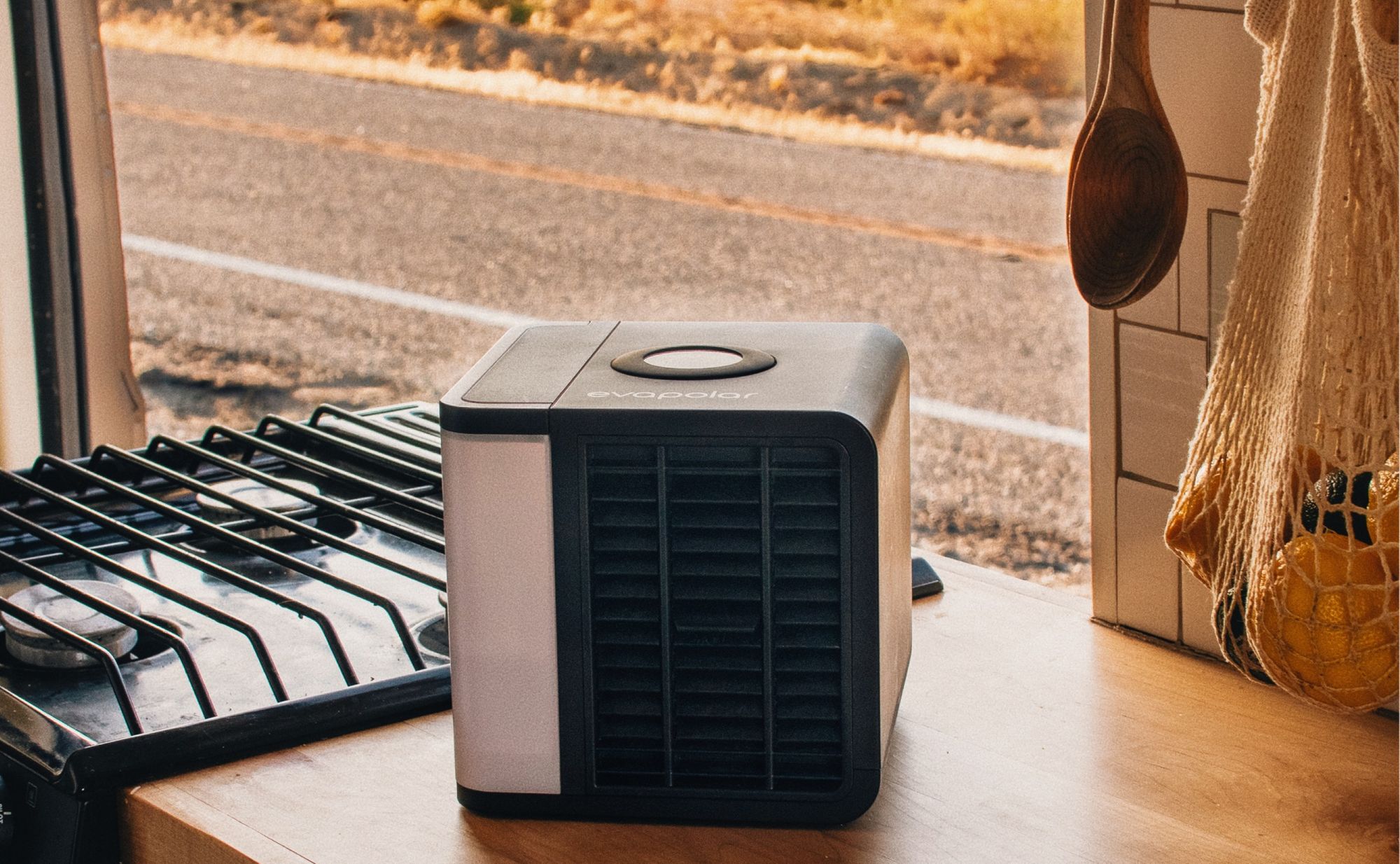
Size and Appearance
AC units for campervans are designed for smaller spaces, but some are still a bit bulky!
Think about how much exterior space a roof unit might take up that could be used for your rooftop vent fans or solar panels. A mini-split needs a significant amount of room both inside and outside of your camper van. Newer sleek and slim 12v air conditioners are the smallest permanently mounted options, but still take up more room than you might think.
And even if you opt for something portable, remember, portable air conditioners still need storage space, too.
Ease of Use
Most air conditioners have a thermostat to let it know when your environment needs cooling, but some need to be turned on manually. This might not sound like a major inconvenience, but if you need it to kick on for your furry friends while you’re out, that could create a problem. Some camping air conditioners have user-friendly features like remote controls and LED displays, while others are less tech-savvy.
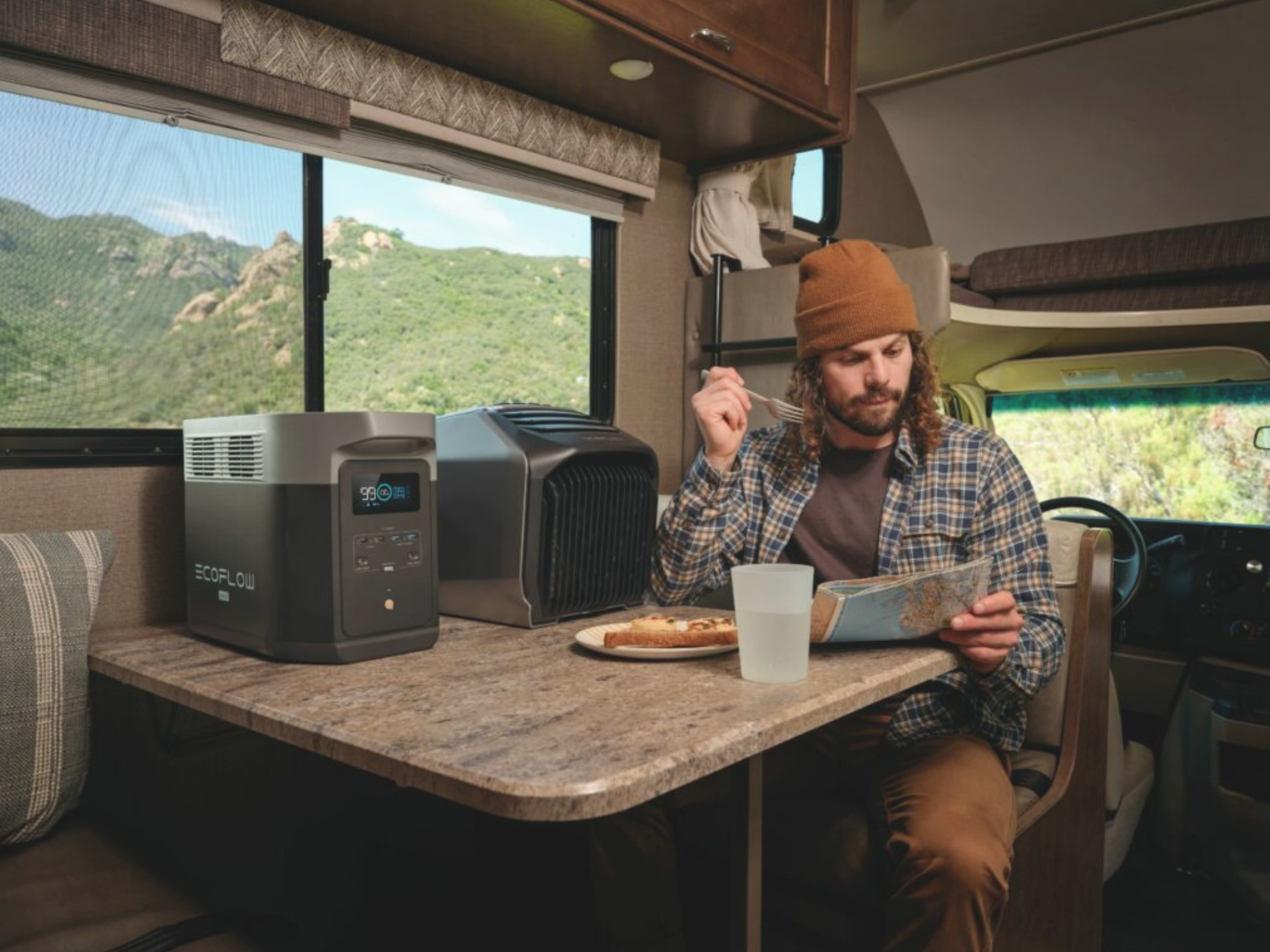
Price
There’s quite a variety in pricing when it comes to camper van air conditioners. Figure out what you need for the size and layout of your space and reconcile that with your budget to help you decide on an AC unit.
Warranty
Be sure to look at the fine print when buying a camper van air conditioner. An air conditioning unit is a large purchase, and you’ll want to make sure there’s some sort of warranty in case it doesn’t work or stops functioning correctly. The last thing you want is to be left in the sweltering heat and out a large chunk of change!
Evaporative Air Cooler / Swamp Cooler Options
A totally different type of cooling system, evaporative coolers, known as “e-vap” or swamp coolers, can make for a much more comfortable environment under certain conditions. Note: these are not air conditioners because they do not remove hot air from an indoor environment. Instead, a fan blows air through water-soaked pads to cool down an area.
Evaporative cooling systems only work in dry climates. They were used in a lot of older homes and buildings in dry desert spots like Arizona. But if you’re in a hot and humid place, like Florida, you won’t get much relief from one of these.
Evapolar makes a small, USB-powered, portable evaporative cooler that will help when it’s pointed directly at you, but it won’t cool down a whole camper van.
Pros: Affordable, use less power
Cons: Only work in dry environments; require water to operate, which can be a finite resource for vanlifers
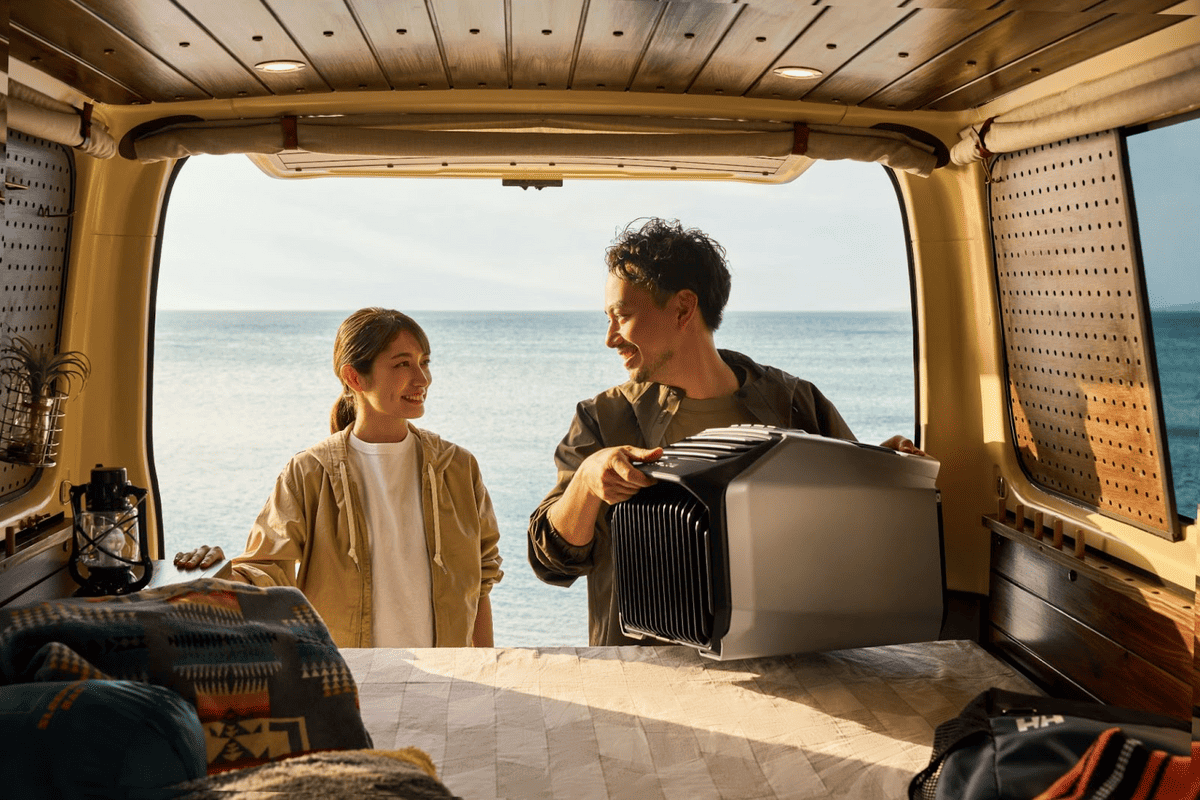
Portable Options
Portable air conditioners are also an option for cooling down your camper van. They are easy to use, ready to go out of the box, and more affordable than permanently mounted air conditioners.
Before buying a portable AC unit, make sure it has enough cooling capacity for your space, and check the wattage as well.
ZERO BREEZE blew onto the market in 2016 with their first portable air conditioner. Since then, they’ve made improvements and upgraded their product to better meet the needs of travelers and off-grid dwellers.
Note: Portable units, such as ZERO BREEZE, with internal compressors, do require hoses or ducts to be placed through a window so that they can take in outdoor air, cool it, and remove the hot air from indoors. Additionally, they produce condensation like traditional air conditioners which will need to be collected since it’s inside the camper van.
Pros: Can be moved around to specific areas of the camper van, some are battery-operated, less expensive than traditional camper air conditioning, efficient cooling
Cons: Some can’t charge their batteries while using the unit, they may still use a significant amount of power, portable units take up interior space, portable ductwork can be a hassle
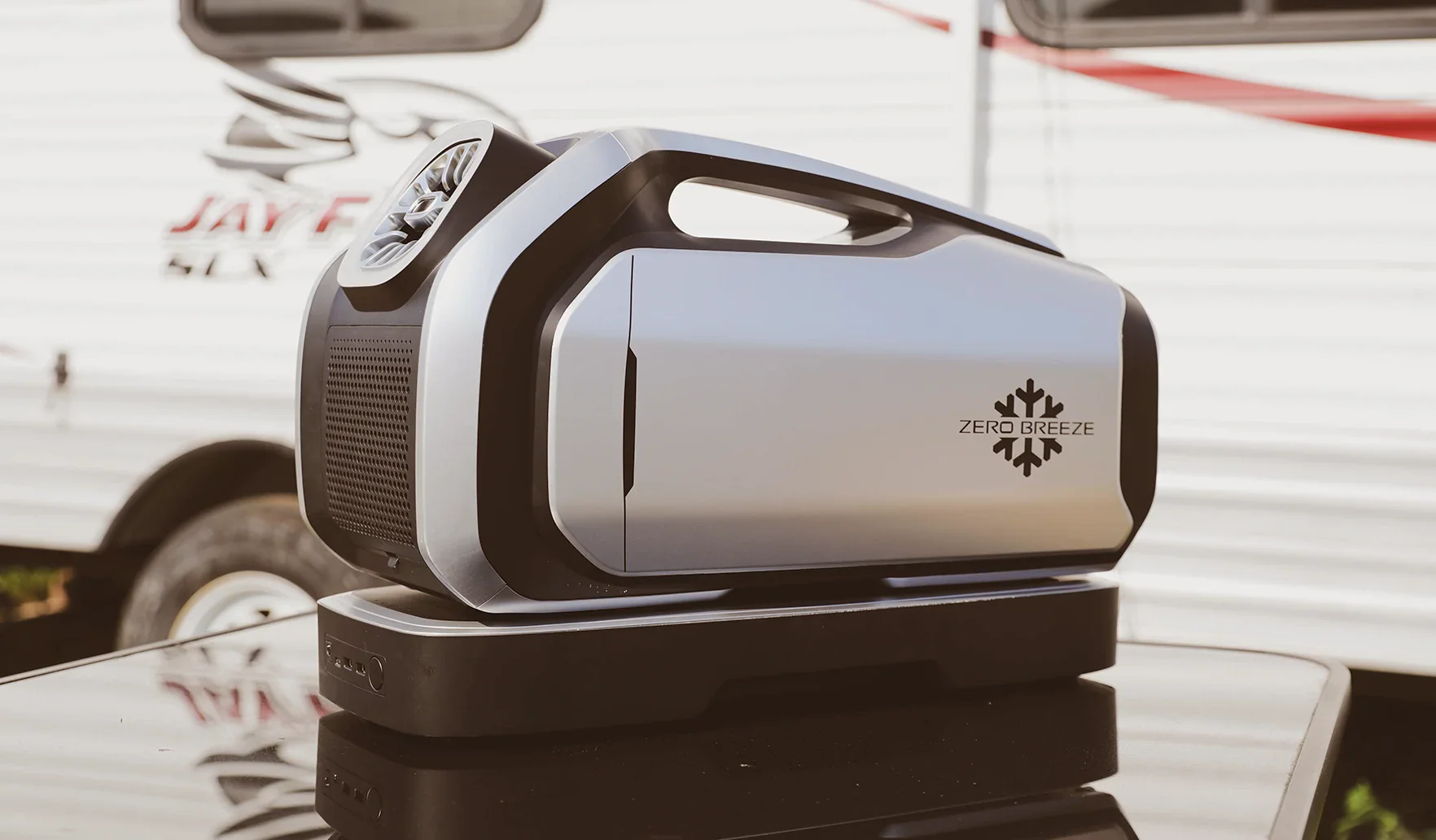
12 Volt Air Conditioner Basics
Traditional household air conditioners are usually 120v units and won’t function with a campervan electrical system. Inverters are used to connect 120v appliances to a 12-volt system, but inverters have wattage limits.
In short, most home ACs are too powerful for a camper van electrical system and most inverters will not support them. If you plan to have a 120-volt AC unit in your camper van, it will most likely need to be powered by a generator or shore power. That means you’ll be dealing with additional noise, having to keep a gas can around, or parking at a place with RV hookups.
Camper vans and RVs typically have electrical things like water pumps and lighting controlled by 12v batteries, and it is fairly simple to hardwire a 12-volt AC unit into the existing system.
Pros: Energy efficient, straightforward installation, can be used with solar power, powerful cooling capabilities
Cons: Power consumption can drain battery banks, expensive, require permanent installation (i.e., cutting into your roof or wall)
Best 12v Air Conditioner for Camper Vans, RVs, and Off-grid Rigs
If you’re planning to boondock and be “off-grid” or disconnected from traditional power sources, it’s important to choose an air conditioner that you’ll be able use with your solar panels and battery bank. After all, you’ll want to run the AC for more than just a few minutes!
Now that you know the different kinds of cooling options for your campervan or RV, it’s time to compare the most popular choices. Check these pros and cons to help you decide what’s best for your camper van.
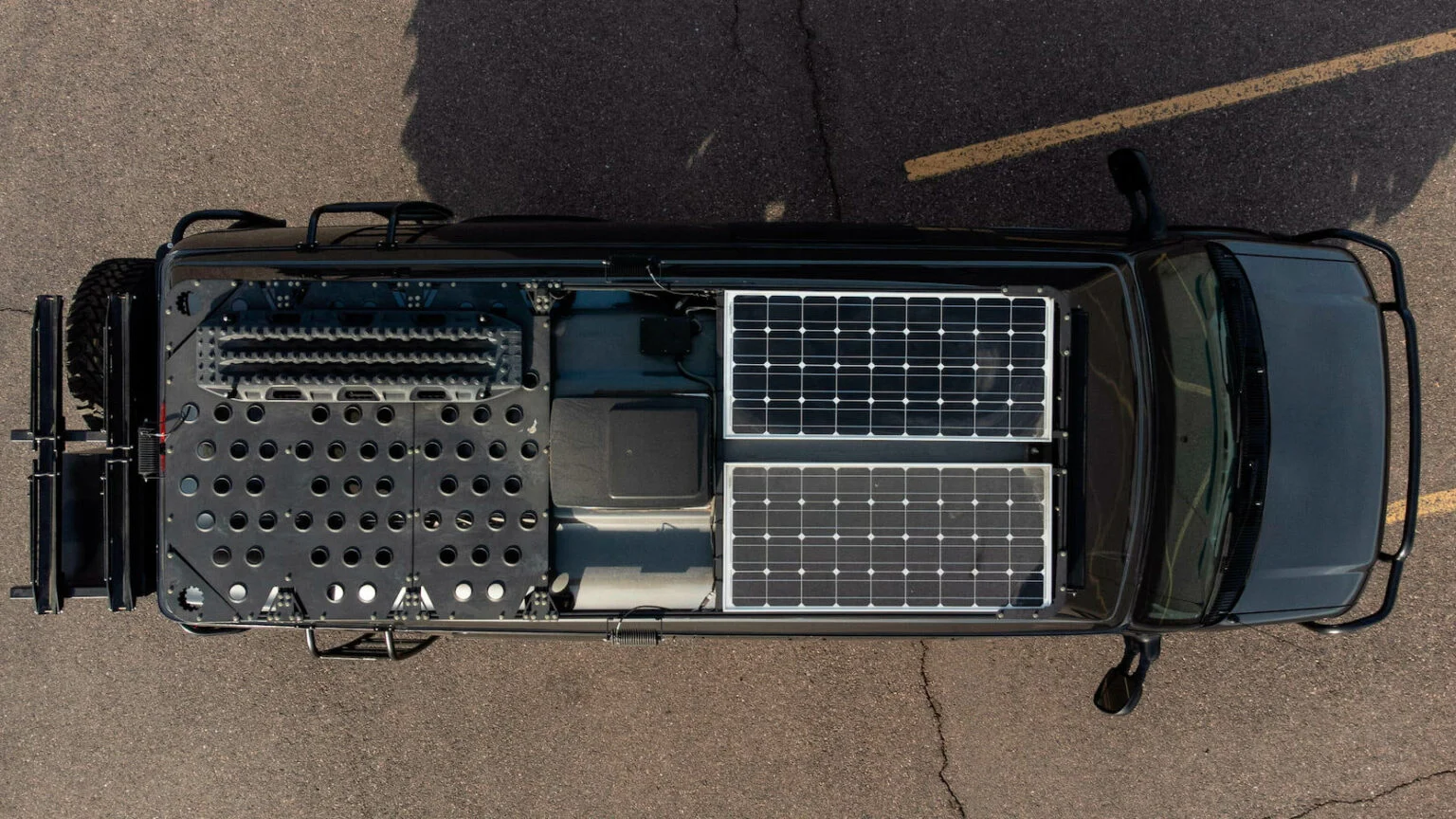
12-Volt Rooftop Camper Van Air Conditioner
The rooftop unit is the most common type of camper van AC. Recent modifications to rooftop air conditioners have made them much smaller and low-profile than past RV models.
Pros: Size/footprint is relatively small, quiet, many different options on the market
Cons: Still takes up exterior roof space which is often needed for roof vent fans, solar panels, and decking or storage; power consumption; pricey; adds weight to the roof
12V Mini-Split
The mini-split has an exterior condenser/compressor and interior blower/evaporator. The inside and outside parts of a mini-split are connected through electrical wires and refrigerant lines. These refrigerant lines need to be recharged regularly to ensure the mini-split can cool down the hot air. Some mini-split models have both air conditioning and heating options.
Pros: Some have a heating option, wide range of prices, can be mounted horizontally and won’t take up roof space, quiet
Cons: More difficult to install, needs regular refrigerant charging
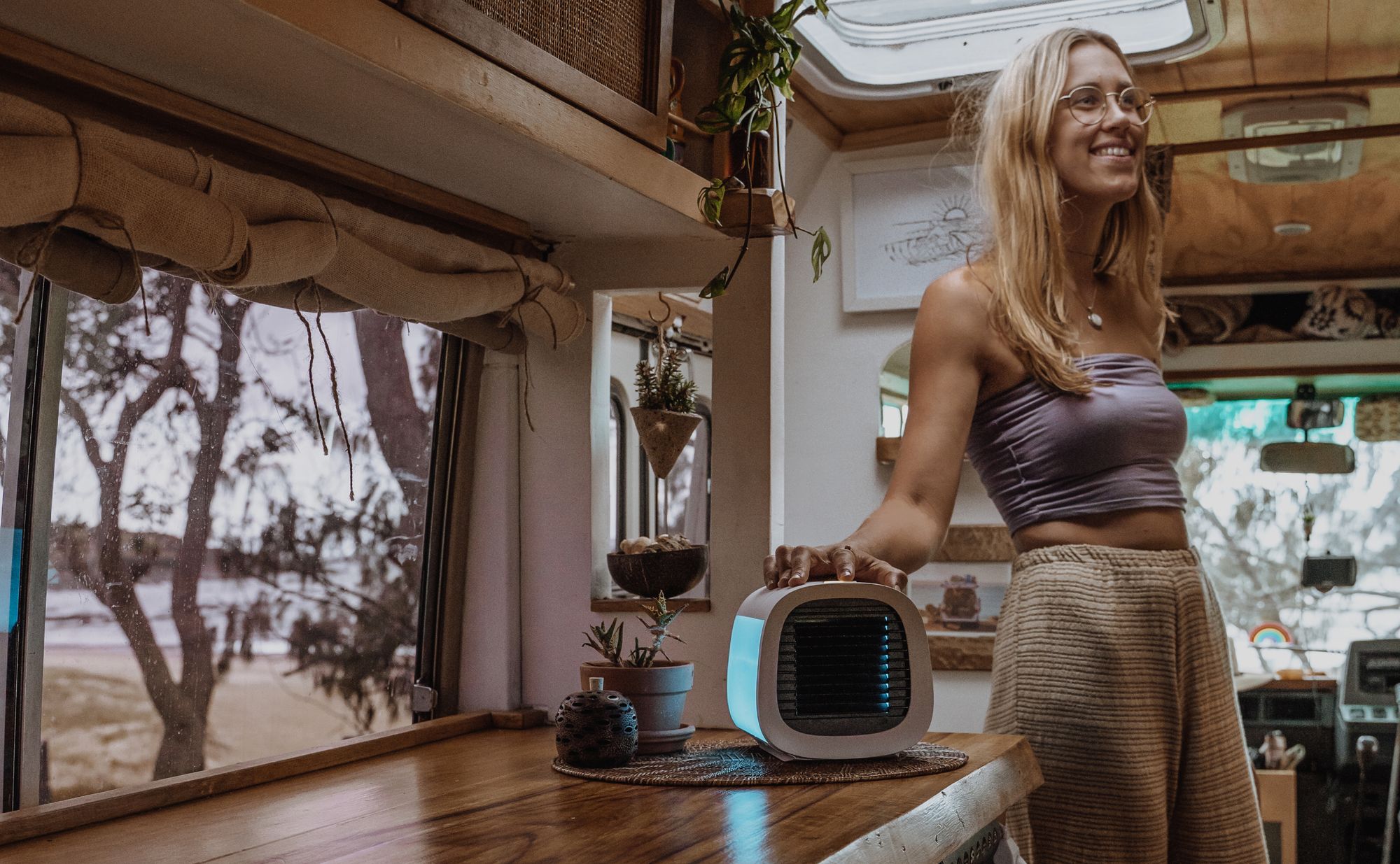
Camper Van Air Conditioner Summary
While air conditioners offer undeniable comfort benefits, they also come with certain drawbacks that should be carefully weighed.
Before purchasing and installing a campervan air conditioner, it’s best to consider your travel habits, climate conditions, budget, and available space. Consult with professionals and pay attention to the BTUs and power draw when selecting an AC unit to ensure that your camper van’s electrical system can handle the additional load. Keep cool and travel on!
